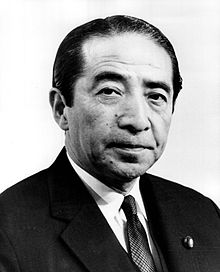

Toshio Kimura
| |
|---|---|
| 木村 俊夫 | |
 | |
| Minister of Foreign Affairs | |
| In office 16 July 1974 – 9 December 1974 | |
| Prime Minister | Kakuei Tanaka |
| Preceded by | Masayoshi Ohira |
| Succeeded by | Kiichi Miyazawa |
| Head of the Economic Planning Agency | |
| In office 5 July 1971 – 7 July 1972 | |
| Prime Minister | Eisaku Satō |
| Preceded by | Ichiro Sato |
| Succeeded by | Kiichi Arita |
| Chief Cabinet Secretary | |
| In office 22 June 1967 – 30 November 1968 | |
| Prime Minister | Eisaku Satō |
| Preceded by | Kenji Fukunaga |
| Succeeded by | Shigeru Hori |
| Personal details | |
| Born | (1909-01-15)15 January 1909 Tōin, Empire of Japan |
| Died | 1 December 1983(1983-12-01) (aged 74) Tokyo, Japan |
| Political party | Liberal Democratic Party |
| Alma mater | Tokyo Imperial University |
| |
Toshio Kimura (木村 俊夫, Kimura Toshio, 15 January 1909 – 1 December 1983) was a Japanese politician who served as foreign minister for six months in 1974.
Kimura was born into a politically active family on 15 January 1909.[1] His father and grandfather were both lawmakers.[2]
Kimura was elected to the House of Representatives for 12 times as a member of the Liberal Democratic Party (LDP).[2] In addition, he served as chief cabinet secretary in the cabinet led by Prime Minister Eisaku Satō.[2] He was also chairman of the Parliamentarians' League for Japan-Palestine Friendship.[2] He organized Yasser Arafat's visit to Japan in 1981.[3]
His other posts include director-general of the economic planning agency and deputy chief cabinet secretary. In 1971, Kimura served as acting foreign minister.[4] He was appointed foreign minister by Prime Minister Kakuei Tanaka in mid-July 1974, replacing Masayoshi Ohira in the post.[5] Kimura was in office for six months in 1974.[2] Kimura visited Africa in late October and early November 1974 which initiated a cooperation between African countries and Japan.[6][7] He was the first senior Japanese government official to visit African countries.[8] His Africa visit included Ghana, Nigeria, Zaire (now the Democratic Republic of the Congo), Tanzania, and Egypt.[7][9] Then Kimura became head of the LDP's Asian-African Studies Group in 1977.[10]
Kimura was married and had a daughter.[2] He died of a heart attack at a hospital in Tokyo on 1 December 1983 at age 74.[2]
![]() Media related to Toshio Kimura at Wikimedia Commons
Media related to Toshio Kimura at Wikimedia Commons
| Political offices | ||
|---|---|---|
| Preceded by Kenji Fukunaga |
Chief Cabinet Secretary 1967–1968 |
Succeeded by Shigeru Hori |
| Preceded by | Head of the Economic Planning Agency 1971–1972 |
Succeeded by |
| Preceded by | Minister for Foreign Affairs 1974 |
Succeeded by |
| International |
|
|---|---|
| National |
|